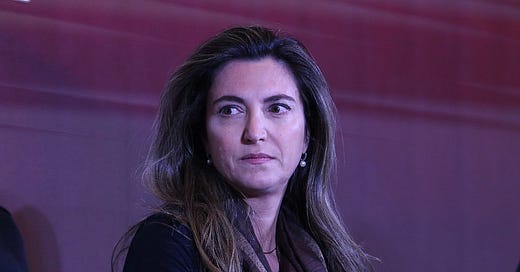Democracy and Digital Militias
Mark Zuckerberg decried "censorship" in Latin America, but many Brazilians see it as consequences for bad actors.
Patricia Campos Mello, Reporter-at-Large and Columnist, Folha de São Paulo © Rick Reinhard 2019
On Feb 19, Donald Trump’s media company sued a Brazilian judge. That move came the day after Brazilian police filed an indictment against the country’s former president, Jair Bolsonaro, a Trump ally, for allegedly participating in a plot to poison the man who defeated him at the polls in 2022, Luiz Inácio Lula da Silva. The Trump Media lawsuit alleges that Alexandre de Moraes, a Minister on Brazil’s Supreme Court, is guilty of censoring right-wing views on social media. Yet the lawsuit looks as though Trump and his powerful Silicon Valley allies would like Brazil’s national sovereignty to disappear.
The balance between national sovereignty and individual and corporate rights is hardly simple, but the threat the major social media companies represent to the country’s self-determination is staggering, as people like Nobel Prize winner Maria Ressa have warned. The US bears a special responsibility in this since these firms are headquartered here and, in spite of repeated scandals and their enabling of the organized efforts to overthrow governments in both Brazil and the US, these companies remain largely unregulated. This has dire consequences for societies and the rule of law. Indeed, a recent report from Rutgers University found that American activists actively spread conspiracy theories in the run-up to the 2024 US presidential election while artificial intelligence is making it harder to spot misinformation.
Two years ago on January 8th, 2023, a mob of far-right Brazilians attacked that country’s primary political buildings: Congress, the Supreme Court, and the presidential palace. The date of the attack and the onslaught itself parallelled a similar insurrection in the US that left five people dead and derailed a centuries-long tradition of peacefully transferring power. Both attacks were fomented over social media. Both were the culmination of a years-long campaign to undermine truth and the rule of law.
Folha de São Paulo journalist Patricia Campos Mello uncovered one end of that thread during the run-up to Brazil’s presidential election in 2018. She wrote an article describing how wealthy businessmen were illegally spending large sums of money on digital farms that would pump out material to benefit candidate Bolsonaro and undermine the leftist Workers’ Party campaign. The race had already been corrupted by a judicial plot to remove the frontrunner, longtime activist and former president Luís Inácio da Silva, known as Lula.
But when Campos Mello’s story appeared, the plot to imprison Lula had not been uncovered.
Nor had the “Cabinet of Hate.” This group, led by Bolsonaro’s third son, Carlos, only came to light in 2019, after journalists discovered the group had used a presidential trip to the United Arab Emirates to connect with the makers of a digital spyware called DarkMatter. This, and revelations from former Bolsonaro allies, led to a Congressional investigation into “fake news.” Members of Brazil’s Congress also introduced a bill to provide guardrails against mis- and disinformation, but it has floundered as right-wing activists have railed against it.
As Brazil’s 2022 election approached, a judge said the 2018 online attacks appeared to have been coordinated and suggested that a digitally-based “criminal organization” aimed to “[subvert] Democracy and the Rule of Law.“
Small wonder, then, that Brazil has been the arena for some of social media platforms’ biggest fights over regulations. Brazil’s Supreme Court shut down the social media accounts belonging to ringleaders of the January 8, 2023 attempted coup.
But in April 2024, Elon Musk defied a Supreme Court order to turn over the IP addresses of those being investigated. Months later, Musk chose to again flout Brazilian law. The country requires foreign companies to have a legal representative in Brazil. Musk’s refusal to designate a replacement when Twitter/X’s representative departed led Supreme Court Minister Alexandre de Moraes to ban the platform temporarily. The charge for violating the ban was a fine of US $9,000 per day. That sum is more than many Brazilians earn in a year.
The power play, though, captured attention in the US, where the chair of the House Judiciary Committee, Rep. Jim Jordan (R, OH), an ally of Donald Trump, published a report describing the Brazilian Supreme Court’s actions as violating free speech.
This isn’t the first time Brazil has seen a prominent US citizen involved in its politics. Brazil’s Federal Police investigated Steve Bannon’s connection to the “fake news” scheme. Bannon has a well-documented relationship with Jair Bolsonaro’s middle son, Eduardo. After Bolsonaro was defeated in 2022, Newsweek reported Bannon told social media followers the election "was stolen in broad daylight” and that he assisted after the re-election loss.
Now, though, the Trump lawsuit is ratcheting up pressure on Minister de Moraes and on Brazil’s elected officials, even as Jair Bolsonaro faces jail time. The upshot, as Bolsonaro himself told The New York Times in January, is that “social networks decide elections.”



